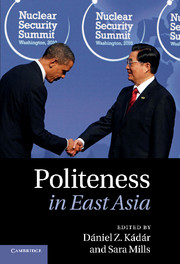Book contents
- Frontmatter
- Contents
- Notes on contributors
- Foreword
- Acknowledgements
- Abbreviations
- 1 Introduction
- Part I Politeness in East Asia: Theory
- 2 Politeness and culture
- 3 Honorifics: The cultural specificity of a universal mechanism in Japanese
- 4 Methodological issues in East Asian politeness research
- 5 Intercultural communication and East Asian politeness
- Part II Politeness in East Asia: Practice
- Notes
- Bibliography
- Index
3 - Honorifics: The cultural specificity of a universal mechanism in Japanese
from Part I - Politeness in East Asia: Theory
Published online by Cambridge University Press: 07 September 2011
- Frontmatter
- Contents
- Notes on contributors
- Foreword
- Acknowledgements
- Abbreviations
- 1 Introduction
- Part I Politeness in East Asia: Theory
- 2 Politeness and culture
- 3 Honorifics: The cultural specificity of a universal mechanism in Japanese
- 4 Methodological issues in East Asian politeness research
- 5 Intercultural communication and East Asian politeness
- Part II Politeness in East Asia: Practice
- Notes
- Bibliography
- Index
Summary
Introduction
Honorifics have been the object of linguistic enquiry for much longer than the broader notion of ‘politeness’ itself, but in spite of such long-standing investigations they pose an epistemological challenge. As grammaticalised linguistic devices typically interpreted as markers of deference to people of higher status, they are commonly conceived as exhibiting a ‘core’ deferential meaning, coded in the very honorific form, therefore constant across instances of use and always presupposed. Deferential forms are assumed to selectively mark literal or metaphorical distinctions of rank or horizontal distance, and therefore we are left to explain how meanings other than social ranks and roles – e.g. affective stances such as aggression or hypocrisy, intimacy, affection – can be routinely conveyed by the same forms. For example, in studies of business discourse, use of honorifics can be taken to modulate power differentials, through the signalling of deference to such power, or the exercise of power itself; in studies on gendered discourse, they can be taken to index, via manipulation of the core meaning of deference, positions of subordination or authority. Issues of power are, of course, of central importance for performing gender or professional identities, but assuming the expression of a deferential intent in any occurrence of an honorific form carries the risk of over-attribution or blatant misinterpretation.
Japanese studies of honorifics have identified a number of regular uses of honorific forms that have traditionally been categorised as ‘secondary’ meanings. The Japanese linguist Hatsutaroo Ooishi (1986 [1975]: 65ff.) for instance lists the following: reverence (agame あがめ), respect (sonchoo 尊重), distance (hedate へだて), formality (aratamari あらたまり), dignity (igen 威厳), grace/good manners (hin'i 品位), irony (hiniku 皮肉), contempt/disdain (keibetsu 軽蔑), endearment (shin'ai 親愛). Others mention ‘polite hypocrisy’ or ‘nasty politeness’ (inginburei 慇懃無礼), or a ‘speech-beautifying’ (bika 美化) function. Thus the range of so-called secondary meanings includes social as well as affective meanings. They are thought to be ‘derivative’ from an original meaning of genuine deference, and are explained as the effects of pragmatic inferences or historical developments, but effectively parasitic to an invariably ‘coded’ deferential meaning.
- Type
- Chapter
- Information
- Politeness in East Asia , pp. 45 - 70Publisher: Cambridge University PressPrint publication year: 2011
- 30
- Cited by



